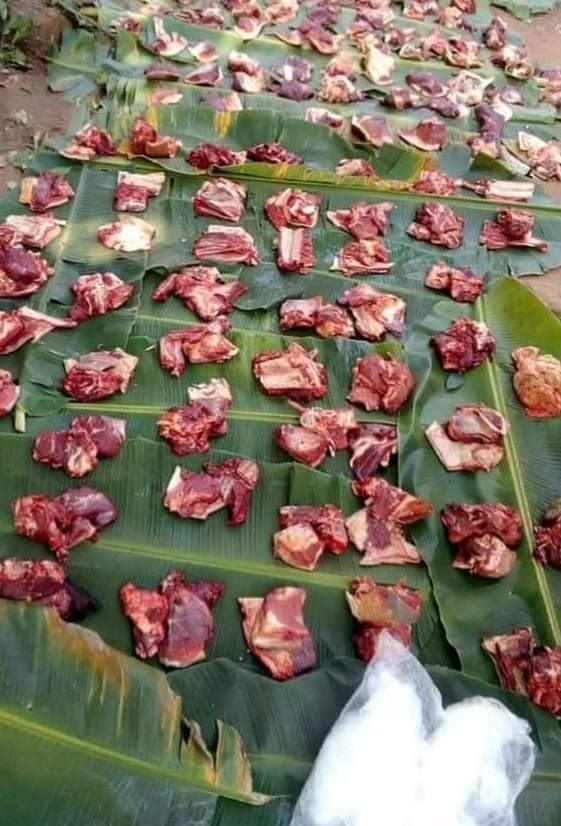Breaking News
How Butchers Inflate Meat with Air to Deceive Buyers — Experts, Videos Expose Food Fraud in Nigeria
The process of injecting meat with air or brine (a salt-water solution) is known in the food industry as “plumping” or “enhancement.” It’s often used to improve texture, flavor, and appearance, especially in poultry.

In Nigeria, meat—especially beef—holds a central place in both culinary tradition and social customs. From daily meals to festive gatherings, many Nigerians believe a plate without meat is incomplete.
But a viral video shared earlier this week has sparked outrage and concern over how some meat sellers may be deceiving consumers in their bid to make extra profit.
Viral Video Sparks Outrage
The 29-second clip, which has been viewed over 36,000 times on X (formerly Twitter), shows a butcher in a Nigerian market inserting a narrow tube into raw beef placed on a table. He appears to be pumping air—and possibly a liquid—into the meat, causing it to swell.
The video was captioned: “How did we really get here? Oh my God, the economy is not really friendly.”
Online reactions were swift and critical, with many Nigerians condemning the practice as a deliberate ploy to increase the meat’s apparent weight and size—ultimately cheating customers.
“They pump the meat and use a faulty weight calculator, just because they want to be a billionaire,” said an X user, @Flacko_VVS.
“This is not about the economy; this is a pure art of wickedness and dishonesty,” added Oke Ayodele. “Nigerians need to do better.”
On Facebook, users shared personal experiences. Chintuo Blessing wrote, “Most meat sellers do this. They pump the tongue, legs and head. When you boil it, it reduces. This is terrible.”
Another user, Elsie Williams, commented sarcastically: “He will give you meat, and you would think you had a good bargain, only to boil it, and you are wondering what happened inside the pot.”
Butchers Say It’s a Common Practice — Not a Scam
Despite the backlash, several butchers insisted the practice is neither new nor dishonest.
“This is what we meat sellers do. It’s not to deceive anybody,” said Salami, a Lagos-based butcher. “It’s just to make the meat easier to separate from the hide. Ask your Muslim friends—this is common during festivities.”
An Ibadan butcher, Ishola Azeez, echoed the sentiment. “That man wanted to peel off the skin of the cow (ponmo). Pumping air into it makes it easier to remove the hide, which can be sold for leather.”
Azeez clarified that once the skin is removed, there’s no further need to pump air into the meat itself.
Experts Warn: Inflating Meat Can Be Fraudulent — and Risky
However, experts in food safety and veterinary science have raised red flags about the practice.
Dr. Ayo Adelaja, a veterinary officer and meat inspector, admitted that inflating animal heads and legs to aid processing is common. But beyond those parts, the practice becomes fraudulent.
“It’s cheating if it’s done to other parts aside from the head and legs,” Adelaja said. “It’s been going on for a long time. It’s now become a ‘norm’ in many markets.”
He noted that at markets like Bodija in Ibadan, meat is sometimes inflated to help remove fur before butchering—especially for ceremonial meats.
What Is “Plumping”?
The process of injecting meat with air or brine (a salt-water solution) is known in the food industry as “plumping” or “enhancement.” It’s often used to improve texture, flavor, and appearance, especially in poultry.
According to VerFoodSolutions, “You can inject brine into bone-in and boneless red meat, whole poultry and fish. This enhances their appearance and gives consumers better cooking results.”
However, in open-air markets, plumping may be driven less by culinary improvement and more by economic motives.
Health and Safety Concerns
Dr. Paul Anejodo, a senior medical officer, warned that air and brine injections can introduce harmful pathogens if done under unhygienic conditions.
“Contaminated pump tubes, unclean hands, and exposure to flies from garbage or faeces can all introduce bacteria into meat,” Anejodo said. “There need to be proper hygiene protocols in markets.”
He added that market environments often lack sanitation, increasing the risk of disease transmission through meat.
“It’s Food Fraud,” Expert Says
Inemesit Ukpong, a Lagos-based food safety expert, described meat inflation as outright food fraud.
“The buyer is misled into thinking they’re getting more meat than they are,” Ukpong said. “The added water or air increases weight but decreases nutritional value.”
Ukpong also raised concerns about the quality of water used to prepare the brine solution: “Is it potable? Does it contain coliform bacteria? Most market water sources are questionable.”
He emphasized the potential health risks from consuming salt-heavy brine or meat processed with contaminated water. “This could contribute to high blood pressure or introduce pathogens. And since most meats in local markets aren’t labeled, consumers have no idea what they’re buying.”
Ukpong concluded: “Food safety isn’t about hope; it’s about science and structure. There must be greater transparency and awareness among meat sellers to avoid putting public health at risk.”
Regulatory Response
When contacted, an official from the Federal Competition and Consumer Protection Commission (FCCPC) urged concerned individuals to file a formal complaint.
“Please send us a written email to address your concerns, along with proof of the claim you are making. We will verify the video and issue a statement,” the FCCPC said.









